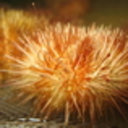Protective effect of curcumin against irinotecan‑induced intestinal mucosal injury via attenuation of NF‑κB activation, oxidative stress and endoplasmic reticulum stress.
キーワード
概要
Irinotecan (CPT‑11) is a DNA topoisomerase I inhibitor which is widely used in clinical chemotherapy, particularly for colorectal cancer treatment. However, late‑onset diarrhea is one of the severe side‑effects of this drug and this restricts its clinical application. The present study aimed to investigate the protective effects of curcumin treatment on CPT‑11‑induced intestinal mucosal injury both in vitro and in vivo and to elucidate the related mechanisms involved in these effects. For this purpose, mice were intraperitoneally injected with CPT‑11 (75 mg/kg) for 4 days to establish a model of late‑onset diarrhea. Curcumin (100 mg/kg) was intragastrically administered 8 days before the injection of CPT‑11. Injury to small intestinal tissues was examined by H&E staining. The protein expression of prolyl 4‑hydroxylase subunit beta (P4HB) and peroxiredoxin 4 (PRDX4) was detected by immunohistochemistry, as well as western blot analysis. IEC‑6 cell viability was detected by MTT assay. Flow cytometry was performed to examine the cell apoptotic rate, mitochondrial membrane potential and reactive oxygen species (ROS) generation. Immunofluorescence was used to observe the localization of nuclear factor (NF)‑κB. The levels of cleaved caspase‑3, glucose‑regulated protein, 78 kDa (GRP78), P4HB, PRDX4 and CHOP were detected by western blot analysis. The results revealed that in vivo, curcumin effectively attenuated the symptoms of diarrhea and abnormal intestinal mucosa structure induced by CPT‑11 in nude mice. Treatment with curcumin also increased the expression of P4HB and PRDX4 in the tissue of the small intestine. In vitro, curcumin, exhibited little cytotoxicity when used at concentrations <2.5 µg/ml for 24 h in IEC‑6 cells. At this concentration, curcumin also improved cell morphology, inhibited apoptosis, maintained mitochondrial membrane potential and reduced the elevated levels of ROS induced by CPT‑11 (20 µg/ml). Furthermore, curcumin abolished NF‑κB signal transduction and protected the cells from CPT‑11‑induced apoptosis by upregulating the expression of molecular chaperones, such as GRP78, P4HB and PRDX4, and suppressing the levels of the apoptosis‑related proteins, CHOP and cleaved caspase‑3. On the whole, our data indicate that curcumin exerted protective effects against CPT‑11‑induced intestinal mucosa injury. The protective effects of curcumin are mediated by inhibiting the activation of NF‑κB, and suppressing oxidative stress and endoplasmic reticulum stress.



